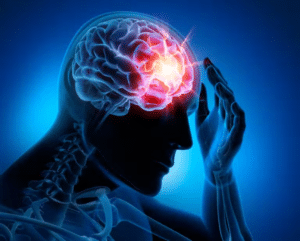Memory Loss After a Concussion
Home » Personal Injury Resources » Memory Loss After a Concussion

A concussion can cause physical symptoms like headache, drowsiness, and clumsiness. It can also cause a brain fog that makes it difficult to focus, concentrate, or even think.
But one of the strangest and nearly universal symptoms after a concussion is amnesia. Immediately after suffering a concussion and for weeks or months afterward, an accident victim might have isolated or even ongoing memory loss.
Read on to learn how your memory works and why you might suffer memory loss after a concussion.
Table of Contents
How Does Your Brain’s Memory Work?

Your brain receives sensory input from your eyes, ears, nose, tongue, and skin. This information helps the brain create a picture of the environment around it.
In most situations, the brain uses this picture briefly in short-term memory to help it solve a problem. This might consist of storing two numbers while adding up a restaurant bill. Or it might consist of storing a street name while looking at a map to find an address. Short-term memory lasts less than a minute for most people.
Occasionally, the brain needs to store information in long-term memory. You remember your childhood in long-term memory. You also use long-term memory for the skills and knowledge you have gained over the years, from playing the piano to reciting the state capitals.
The brain encodes long-term memories into neural connections. The more you practice or encounter a situation, the stronger the connection becomes.
Both short and long-term memory work in two steps. Encoding happens when the brain stores a memory. Recall happens when the brain retrieves the memory. Amnesia can happen when you have a problem either encoding or recalling a memory.
How Does a Concussion Happen?
A concussion happens when your brain sloshes inside your skull. A layer of cerebrospinal fluid (CSF) surrounds your brain. The CSF slows the brain’s motion when your head undergoes an impact or whipping motion. But in slowing the brain, pressure from the CSF can damage brain cells.
The damaged brain cells cause the body to trigger inflammation. As the brain swells and warms up, you suffer symptoms such as:
- Headache
- Confusion
- Amnesia
- Tinnitus
- Clumsiness
- Slurred speech
- Drowsiness
Doctors have several scales to rate the severity of a concussion. Team doctors for professional sports teams often use the Glasgow Coma Scale to rate in-game head injuries quickly.
The Glasgow Coma Scale rates a concussion as mild, moderate, or severe based on three responses:
- Eye-opening response
- Motor response
- Verbal response
The verbal response will reveal the cognitive effects of the injury. You will often hear an EMT or doctor ask questions of someone who may have a concussion.
These questions might include:
- What is your name?
- Do you know where you are?
- What is the date (or day of the week)?
- Do you remember what happened?
The responses to these questions will help medical providers assess the severity of the concussion.
If the person can give oriented responses, even if they give the wrong answers, they have a mild concussion. If the person can use words, but they are jumbled or used incorrectly, the person has a moderate concussion. They may have a severe concussion if they can only make sounds or cannot respond.
The responses may also reveal whether the patient has amnesia. Just beware that incorrect answers so soon after a brain injury can have multiple causes, including that the patient did not understand the question.
What Are Some Reasons You Might Suffer Memory Loss After a Concussion?
Memory loss after a concussion can have many causes, including:
Problems Encoding Memories of the Accident
Short-term memories last less than a minute. When you suffer a traumatic event like a car accident or fall, your brain might not have time to encode the memory before getting injured. When you try to recall the accident later, it will seem like the memory simply does not exist because the brain never encoded it.
Amnesia of the accident that caused a concussion is very common. You might never regain this memory because it was never stored in your brain.
Blocking Recall of Memories of the Accident
Post-traumatic stress disorder (PTSD) allows the brain to protect itself from another trauma. It heightens the body’s sensitivity to stress to reduce the risk of getting traumatized again. This means minor triggers can send the body into its full fight-or-flight mode.
One effect of PTSD is that the brain will suppress memories of the trauma. These triggers will overwhelm the body and brain, so the brain blocks them.
In this situation, the memories of the accident got encoded. But the brain blocks you from recalling them. You might recover these memories if you work with a therapist to process the trauma blocking them.
Damage to the Memory Centers of the Brain
In rare situations, the concussion will damage the parts of your brain responsible for encoding, storing, and recalling memories. If this happens, you might suffer ongoing memory problems.
A common form of amnesia affects your ability to form new memories. This will often cause people to seem like they cannot acquire new skills or information. Instead, they have trouble storing the information they need to repeat a previously learned skill or fact.
How Do You Get Compensation for Memory Loss After a Concussion?
You can seek compensation when an accident results from someone else’s negligence. To prove negligence, you must show that someone failed to exercise reasonable care, and as a result, you suffered a concussion.
You can recover economic and non-economic damages if you can prove negligence. Economic damages include your financial losses due to medical bills, lost income, and diminished earning capacity. Non-economic damages include the diminishment in your quality of life due to pain, mental anguish, and inability to perform tasks.
Ongoing short-term memory loss can significantly interfere with your ability to work. If your working memory does not work correctly, you cannot learn new tasks.
Amnesia can also diminish your quality of life. You will need assistance with your daily activities like shopping, cooking, and driving if you have problems with your short-term memory. Even if you regain your memory after your accident, losing your memory can cause you significant mental anguish and anxiety.
To learn about the compensation you can seek for memory loss after a concussion, contact or call M&Y Personal Injury Lawyers at 866-864-5477 to schedule a free consultation.
RESOURCES
- Claim vs. Lawsuit
- Evidence
- Six Questions to Ask a Personal Injury Lawyer in Los Angeles, CA During a Free Consultation
- Types of Damages Available in Los Angeles Personal Injury Cases
- Understanding the Statute of Limitations in California
- What Are Economic Damages?
- What Is Causation?
- When Should I Hire a Personal Injury Lawyer in LA?
- View All +
PRACTICE AREAS
SEARCH OUR SITE
OUR OFFICES
6300 Wilshire Blvd. Suite 807
Los Angeles, CA 90048
Los Angeles Law Office Map
350 S Figueroa St. Suite 276
Los Angeles, CA 90071
Downtown Los Angeles Law Office Map
Call: (877) 751-8953
402 W. Broadway #400
San Diego, CA 92101
Call: (619) 404-2797
2400 E Katella #800
Anaheim, CA 92806
Call: (714) 386-7623
8050 N. Palm Ave. #300
Fresno, CA 93711
Call: (559) 853-4863
6360 Van Nuys Blvd. #219
Van Nuys, CA 91401
Call: (213) 296-1243
11801 Pierce Street #200
Riverside, CA 92505
Call: (951) 234-5468
99 S Almaden Blvd #600
San Jose, CA 95113
Call: (408) 617-8928
111 West Ocean Blvd. #400
Long Beach, CA 90802
Call: (562) 354-8219
473 E. Carnegie Drive #200
San Bernardino, CA 92408
Call: (818) 650-3861
